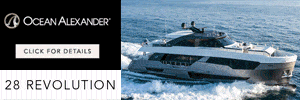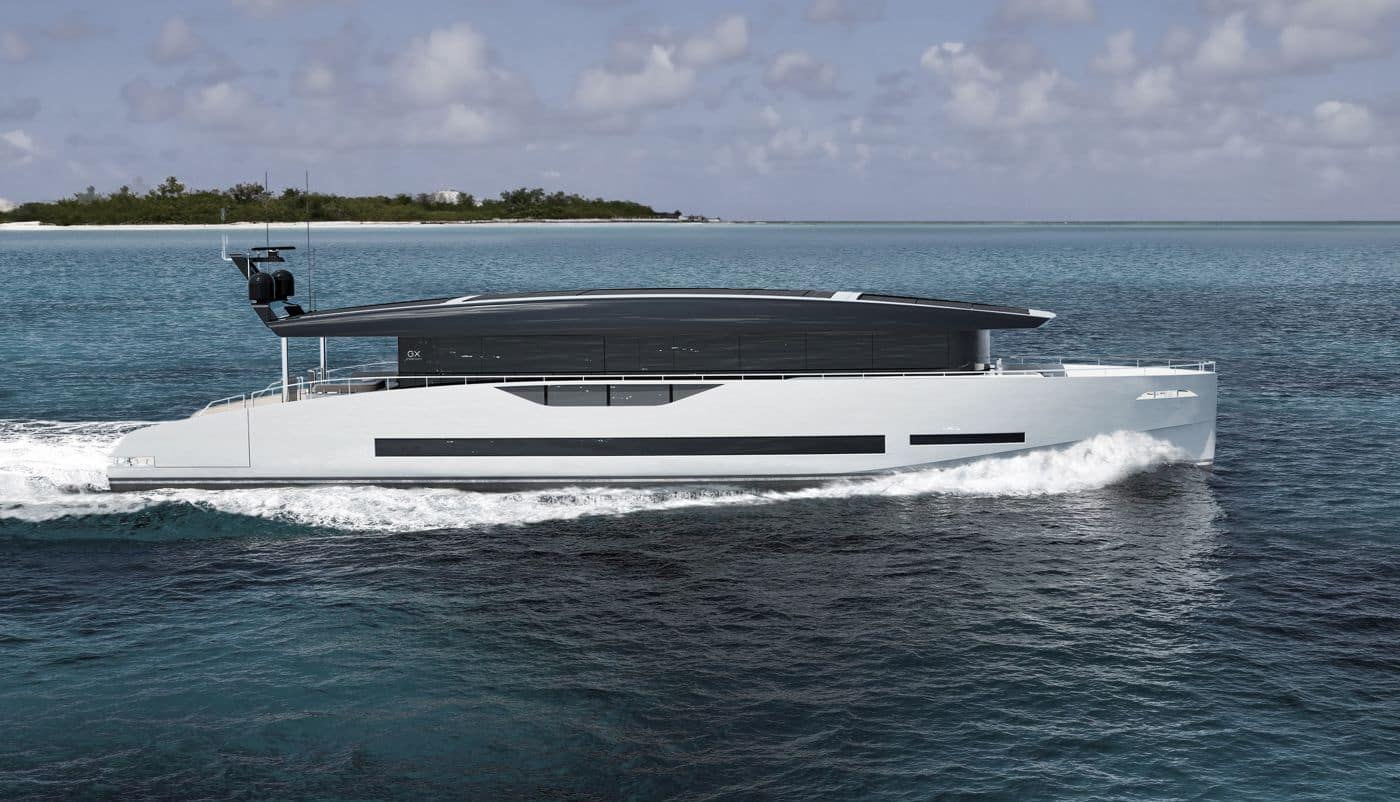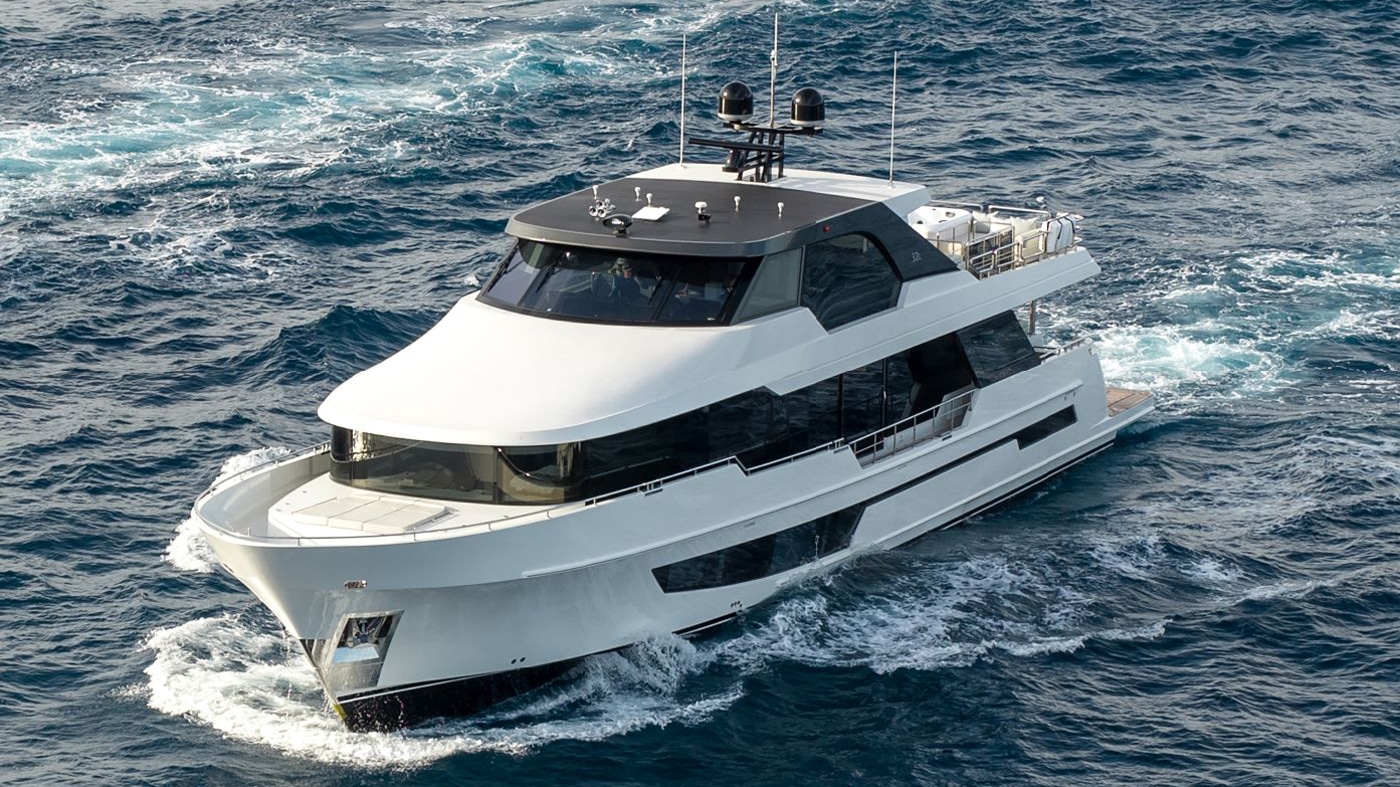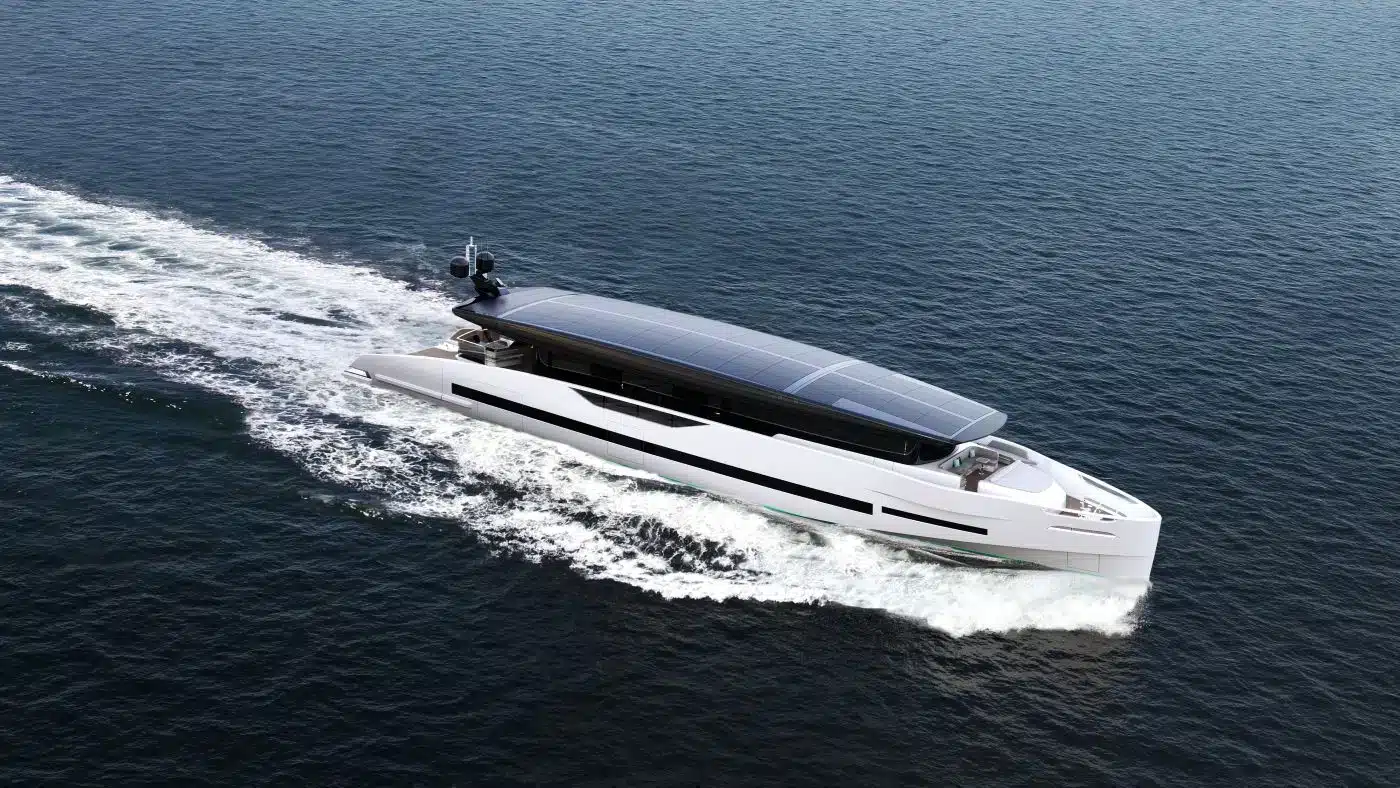The Swan 120 brings together the skill and craftsmanship of three distinct groups, all renowned in their individual fields, and working together, in partnership, to create a masterful interpretation of the modern superyacht. Delivering unparalleled comfort, safe passage-making and the requisite level of reliability, the Swan 120 resets the bar for this size of yacht.
The naval architecture for the inspirational project emanates from the Buenos Aires office of maestro, Germán Frers, house designer for Nautor’s Swan since the early 1980s. A fresh, influential element in the longstanding collaboration between Argentinean flair and Finnish build-prowess, is the interior design contribution of Genovese architect, Misa Poggi.
Featuring the latest construction techniques and materials, along with an innovative range of solutions, the Swan 120 is aimed at defining the next generation of performance superyacht design.
Shaping the present, influencing the future
The shape of the Swan 120 reflects the elegance and style Frers brings to all his yachts, particularly Swan yachts where the lines are instantly recognizable and make a statement in every harbour and on every ocean.
From the stunning stem, with the typical Germán Frers sheerline, the hull lines sweep gently aft. From around the mid-point, the smooth rocker in the hull rises to a masculine stern with powerful, dynamic quarters above the waterline. The hull design carries almost all of the maximum beam right aft, a concept that delivers excellent form stability when heeled and at the same time creates generous volume below.
At deck level, a clean foredeck leads aft to the coach roof of the raised saloon, which blends seamlessly into an expansive, protected cockpit area. This core element of the experience afloat is completely free of lines, enabling those not engaged in the sailing of this sublime superyacht to truly relax while underway. The detailed design conceals a sophisticated, electrically controlled bimini top and sprayhood, which disappears into completely flush coach roof cassette when not in use, and offers extensive shelter from sea and sun.
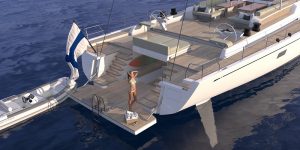
At anchor, the cockpit area transforms into an encompassing lounge space. With versatile deck sofas, it is the perfect place to unwind as the sun sets before converting into an elegant, intimate dining area. Following the philosophy of other designs in the Maxi Swanline, the Swan 120 also offers ‘aisle seats’ to enhance both the sailing and leisure experience.
Aft of the deck lounge is a clean deck space, still sheltered by the coamings, which runs to behind the steering pedestals with ‘aero-seating’. In-between the helming stations, it is
possible to incorporate a ‘snug-island’, which provides protected access to the aft accommodation with a dodger, sprayhood and cozy seating for those on watch.
The voluminous stern section will gain real attention when the yacht is at rest. The transom folds down hydraulically to form a teak-decked swim platform and reveal spacious garage housing a tender of 4.5 metres and other toys of choice. Once the tender is launched, the large area becomes available for watersports, sunbathing and even dining. The design means the clean Swan stern under sail effortlessly transforms into a large ‘beach-deck’, connected to a well-organized ‘hangar’ for maximum entertainment at anchor. In addition to the stern platform swinging down, a section of the aft-deck may be opened up to convert into a large sunbed at deck level.
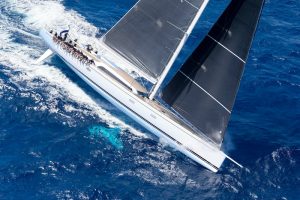
The hull and deck of the Swan 120 will be a full carbon fibre construction, using epoxy SPRINT® pre-preg carbon fibre interior and exterior skins on a core of M-grade Corecell foam. The pre-preg system provides the ultimate in structural stiffness and rigidity at the lightest possible weight, while at the same time ensuring absolute structural integrity. The hull will be laid up in a female mould tooled from the same technology, thereby ensuring identical mechanical properties when the hull undergoes heat curing using the very latest in oven technology.
The yacht will be brought to life in Nautor’s Swan’s state-of-the-art superyacht facility in Pietarsaari, Finland. Latest materials, cutting-edge build techniques and the finest craftsmanship, for which Nautor’s Swan is renowned the world over, will be employed.
The Interior Touch of Swan 120
Within this graceful hull is an interior designed by architect Misa Poggi. Two principal interior concepts have been conceived: Owner Aft and Owner Forward. Both Owner stateroom configurations, offer three exceptional guest cabins, each with ensuite bathroom. Misa has developed a sophisticated theme specifically for the Swan 120 project, featuring the finest Italian textiles and leathers to create the ultimate ambiance in comfort and luxury, for the Owner as well as family and guests.
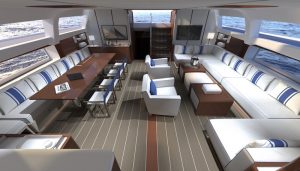
The spacious saloon is accessed from deck via a magnificent 1.8m wide companionway door constructed of curved glass to maximise ease of access and natural light below. Both full-beam, comprehensively-appointed owner’s suite options feature Misa Poggi’s stylish design-touches with ensuite facilities and the possibility of a walk-in wardrobe.
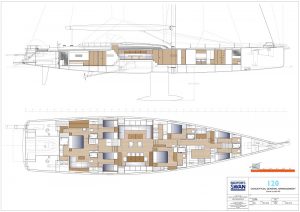
In addition to the Owner’s stateroom, there are three ensuite guest cabins envisaged, one double and two twins, along with three twin crew cabins, also ensuite. In both layouts, for privacy, the galley and laundry are positioned close to the crew quarters and provide everything needed for seamless service of the Owner and guests.
At the heart of the yacht, and flooded with natural light from the coach roof above, is a spacious saloon, featuring a lounge area to port and a dining suite to starboard.
There is a unique saloon layout option that features a large hull window adjacent to daybeds. This soft-furnished space is perfect while under sail or just before the night falls. The proximity to the hull and water offers an experience of the sea in true alignment with Misa’s core philosophy for the interior. It has been commented that these saloon beds are reminiscent of the ‘pilot berths’ typically found in Swan yachts from the 1970s.
Systems, Rig & Appendages
The Swan 120 comes with a comprehensive specification as standard, but there is an extensive list of options to ensure each yacht reflects her Owner’s unique interests and style. Three sail-plan configurations echo the diversity of approach to the sport of sailing and that different Owners will favour different sailing grounds. Capable of world girdling exploits to concentrating exploration of the Mediterranean, Caribbean or Pacific, the emphasis will always respond to the needs.
In addition to the sail-plan considerations, Nautor’s Swan has given thought to the underwater appendages. Chief among these is the option of a telescopic keel, which reduces draught from 5.5 to 3.5 metres. In conjunction with the standard twin rudders, this keel option opens up a world of shoal-draft lagoons, colourful harbours and remote, unspoiled anchorages without compromising sailing performance. As expected, the system design is optimized for safety and reliability without any intrusion into the interior.
The anchor for a vessel of this size is critical piece of equipment and the design-thinking has had made sure that the Swan 120 has an appropriate system. The anchor is launched and retrieved by means of a hydraulic retracting and folding arm, utilizing a design that has proven its reliability and ease of use over many years.
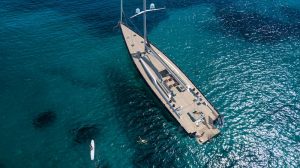
The Swan 120 has been designed to enable worldwide cruising without compromise. Advanced sail handling systems are complemented by abundant deck stowage including a spacious forward sail locker and two aft lazarettes. She also has generous tankage for both water and fuel, all easily inspected. Below the raised saloon is a full-beam engine room providing excellent access to her 450hp main engine, the two generators and other electrical and hydraulic systems.
For those wishing to compete, there is a comprehensive racing package that includes a square-top mainsail with running backstays; a double-length bowsprit with bobstay for fast reaching with powerful masthead gennakers and even the option to integrate a concealed anchor system.


